 Global ambassadors of ecotourism gather in Nanjing
Global ambassadors of ecotourism gather in Nanjing
 Taiwan woman marries into Kazak family, 100 sheep plus a flat as dowry
Taiwan woman marries into Kazak family, 100 sheep plus a flat as dowry
 College girls take graduation photos under water in Chongqing
College girls take graduation photos under water in Chongqing
 Cartoon: Xi and football
Cartoon: Xi and football
 Chinese influence sweeps ROK
Chinese influence sweeps ROK
 Post-90s beauty boxer grapples four men
Post-90s beauty boxer grapples four men
 3,000-year-old tea town through lenses
3,000-year-old tea town through lenses
 22 archaeological sites along Silk Road in China
22 archaeological sites along Silk Road in China
 Football babies, Samba dancers embrace 'World Cup'
Football babies, Samba dancers embrace 'World Cup'
 Beautiful scenery along China’s Grand Canal
Beautiful scenery along China’s Grand Canal
The State Archives Administration started releasing a large number of files on major Japanese war criminals on its website on Thursday to offer a clearer picture of history.
"The confessions written by all the war criminals and the detailed trial records contained in the archived files are irrefutable evidence of the heinous crimes committed by the Japanese militarist aggressors against the Chinese people," Li Minghua, deputy director of Central Archives of China, said on Thursday.
Since the Abe Cabinet came to power in Japan, it has openly confused right and wrong to mislead the public on history, he said at a news conference of the State Council Information Office.
With the upcoming 77th anniversary of the Marco Polo Bridge Incident - an incident that marked the start of Japan's full aggression against the nation - the release of such materials can prove their crimes during the Japanese War of Aggression against China, experts said.
By exposing the atrocities, these archives can prove the Abe Cabinet is wrong in its treatment of history, he said.
After the birth of New China in 1949, a total of 1,109 Japanese war criminals were held in custody in two Chinese cities. The special military tribunal of the Supreme People's Court had public trials of the 45 major criminals, sentencing them to from eight to 20 years in prison.
Except for 47 who died in custody, the other 1,017 were exempt from prosecution and released in 1956 because they had relatively minor offenses, good behavior and showed remorse.
The archives will release materials on the major criminals one by one over the next 45 days. The files of the minor criminals are being prepared for future release, the deputy director of the central archives said.
Earlier this year, some Japanese Cabinet members and executives of public broadcaster NHK triggered controversy with revisionist remarks.
Feng Wei, a professor of Japanese history studies at Fudan University in Shanghai, said the evidence is time-tested and undeniable, and it is time for people to "bring an end to the appalling rush of Japanese lawmakers continually denying the country's wartime deeds".
Some of them denied the Nanjing Massacre or Japan's forcing women into sexual slavery in the first half of the 20th century.
Yang Bojiang, a senior expert on Japan studies at the Chinese Academy of Social Sciences, said the ruling Cabinet has felt the mounting pressure on the historical issue, but it is still "implicitly whitewashing Japan's aggression".
Zhou Yongsheng, a professor of Japan studies at China Foreign Affairs University, said, "Our choice in remembering history is not to add fuel to hatred but ... to avert the historical tragedy from happening again."
But all the deeds that the Abe Cabinet denied can be found in these files, including original written confessions, supplements, corrections, postscripts, as well as Chinese translations with abstracts. The original materials run up to 200,000 pages.
The first war criminal whose materials were released is Keiku Suzuki, who had confirmed all the crimes listed at the trials.
In his written confession, Suzuki said he murdered 1,280 peasants in Daizhuang, a village in Hebei province, "in such cruel ways like shooting, bayoneting, slashing and burying alive, and burned down the houses of over 10,000 households" in October 1942.
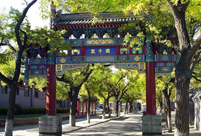 Featured hutongs in Beijing
Featured hutongs in Beijing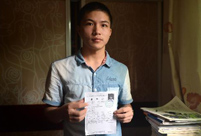 Separate college entrance exam
Separate college entrance exam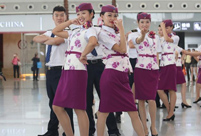 Flash mob dance
Flash mob dance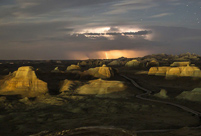 Picturesque scenery of Ghost City
Picturesque scenery of Ghost City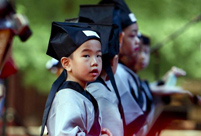 Children attend First Writing Ceremony
Children attend First Writing Ceremony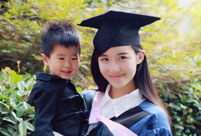 Female master poses for graduation photos with son
Female master poses for graduation photos with son Silk Road, China's Grand Canal listed as World Heritage Sites
Silk Road, China's Grand Canal listed as World Heritage Sites PKU students imitate famous paintings in real-person photos
PKU students imitate famous paintings in real-person photos Chinese 'Slumdog Millionaire'
Chinese 'Slumdog Millionaire' Islands in S. China Sea better shown on new vertical atlas of China
Islands in S. China Sea better shown on new vertical atlas of China Girl takes father’s portrait to travel the world
Girl takes father’s portrait to travel the world Images of Xi'an: Part one
Images of Xi'an: Part one In Pictures: Female fans of World Cup
In Pictures: Female fans of World Cup Top 20 hottest women in the world in 2014
Top 20 hottest women in the world in 2014  China's top 10 representative architectures
China's top 10 representative architecturesDay|Week|Month